Saudi Crown Prince Starts Tour Of Gulf Arab States
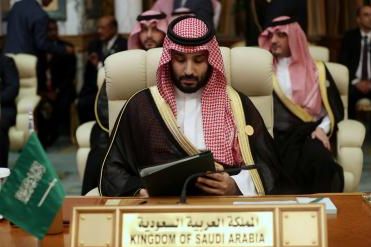
Saudi Arabia's de facto ruler Crown Prince Mohammed bin Salman starts a tour of Gulf Arab states on Monday ahead of an annual Gulf summit, amid nuclear talks with Iran.

Saudi Arabia's de facto ruler Crown Prince Mohammed bin Salman starts a tour of Gulf Arab states on Monday ahead of an annual Gulf summit, amid nuclear talks with Iran.
Prince Mohammed will visit Oman, the United Arab Emirates, Bahrain, Qatar and Kuwait, Saudi-owned Al Arabiya television reported. Oman will be the first leg of the tour.
It would be the crown prince's first trip to neighboring Qatar since Riyadh and its Arab allies imposed an embargo on Doha in mid-2017.
Al Arabiya said the summit of Gulf Arab leaders would be held in the Saudi capital Riyadh in mid-December.
Saudi Arabia and the UAE have engaged with long-time foe Iran in a bid to contain regional tensions as indirect talks between Washington and Tehran to revive the 2015 nuclear pact drag.
The latest round of talks with Iran ended on December 3 without any results, leading to dismay among Western powers. Persian Gulf Arab states saw the 2015 nuclear deal as flawed for not addressing Tehran's missiles program and network of regional proxies.
Saudi Arabia's crown prince starts his regional tour on the same day that the UAE's top national security adviser is expected to Iran.
Saudi Arabia in April launched direct talks with Iran, to reduce tensions. Riyadh has described the discussions, held in Iraq, as largely exploratory.
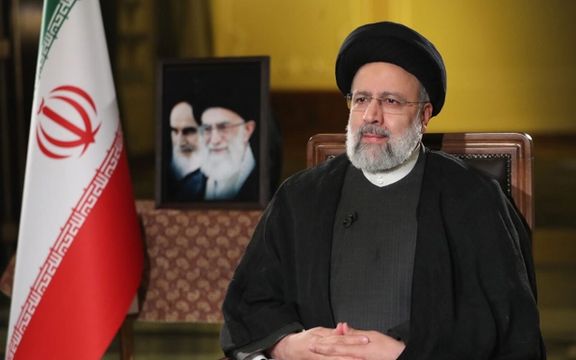
In a televised talk Sunday, Iran’s President Ebrahim Raisi only briefly addressed Iran's nuclear issue saying he is keenly pursuing the "lifting of sanctions".
Raisi said Western countries thought his government would not continue the nuclear talks and "had nothing [worthy] to say" but "it has now been proven that we [did]. We presented a text [in the new round of talks] and the matter is being pursued," he said.
In the one-hour program, Raisi spoke about the nuclear issue for less than 2 minutes.
The first round of talks after Raisi took office was held from November 29-December 3 and ended without any progress. The United States and European allies voiced dismay and pessimism, saying Iran reneged on all compromises made during earlier rounds oftalks in Vienna.
He added that his government "does not tie the country's budget and economy" to the issue of nuclear talks and is working towards the "lifting of US sanctions" while making every effort to "neutralize [the impact of] sanctions" through establishment of a special taskforce for the purpose.
The interview announced a day earlier was on the occasion of the first 100 days of his presidency, although that was 20 days ago.
The interviewer referred to Iran's full membership in the Shanghai Cooperation Organization(SCO) in September as one of Raisi's foreign policy "achievements" and Raisi himself said he has been very active in foreign policy matters with an emphasis on relations with neighboring and regional countries and held "over 100 meetings and phone calls" with leaders of other countries since taking office.
Biggest achievement
When asked how he himself rated his administration's performance, he spoke about the accelerated pace of Covid-19 vaccination in the past 4 months and blamed the Rouhani government for the slow progress until August. Raisi claimed credit for “over 100 million doses of Covid vaccines" administered in four months, which he said made it possible to reopen “over 100,000 businesses".
Asked why vaccines were not readily available before he took office despite purchase orders having been placed during his predecessor, he said he had contacted officials of other countries personally, ordered the government to provide the cash needed for buying vaccines and supported domestic vaccine developers.
Iran’s vaccination effort until August was slow compared to other countries because Supreme Leader Ali Khamenei banned the purchase of American and British vaccines for political reasons at a time when they were the main products available.
Soon after taking office, in a phone call with the Chinese President Xi Jinping, Raisi urged China to deliver Covid vaccines to Iran urgently. Chinese vaccines make up most of vaccines imported.
The state-controlled TV's interviewer described the government's performance in healthcare including vaccination as "brilliant". Critics of the government have alleged that Raisi's administration has been taking credit for vaccines procured by the previous government.
Critics have said the Islamic Republic officials have lied and bluffed their way during the pandemic.
The riddle of the economy
Regarding the economic crisis people face, Raisi said when he took office reserves of basic commodities were troublingly low but his administration has managed to procure basic foodstuff such as wheat to bring the reserves to an acceptable level.
Raisi said his government is monthly paying 10,000 billion rials ($230 million) on average for purchases made by the previous government. He claimed that his government has succeeded in making all necessary payments without borrowing from the central bank which would cause higher inflation. He said inflation has come under control and the rate of its growth is decreasing.
Iran’s former central bank chairman Abdolnasser Hemmati tweeted Sunday that the government is essentially printing money, since all banks in Iran are affiliated with the state and when the government borrows money from them, the central bank has to print more money.
The president’s critics from all factions say that he has done little in his first months to address multiple crises facing the country, the most important of which is a nuclear agreement to pave the way for lifting of US sanctions. He has been warned that without removing the crippling restrictions, there could be no solution to the huge budget deficit, high inflation and the rapidly falling standards of living.
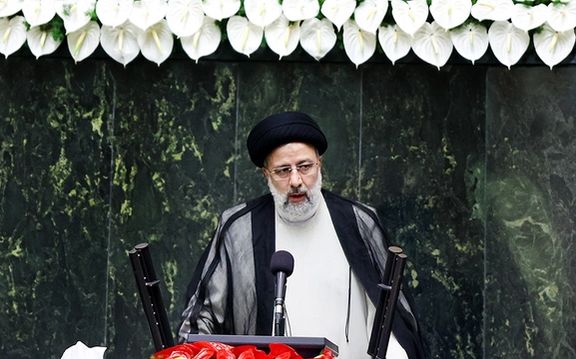
Four months after President Ebrahim Raisi took office, most of his critics come from the like-minded conservative camp rather than from his political rivals.
Some of the harshest comments about the new administration's failures and disappointing performance come from hardliner conservatives such as former lawmakers Ahmad Tavakoli, Mohammad Javad Bahonar and current lawmaker Elias Naderan. Tavakoli and Naderan are both economists and their comments bring Raisi's economic policy under attack.
According to reformist daily Sharq, Tavakoli's criticism of Raisi for choosing "problematic individuals" for his cabinet and the superstitious myths his supporters are spreading about Raisi's supernatural capabilities have met with criticism within the conservative camp.
Tavakoli, a well-known advocate of campaigning against corruption, wrote in a recent letter to Raisi that his policy about allocating preferential rate of exchange for purchasing essential commodities for the nation, follows "a wrong policy dictated by the International Monetary Fund that has brought about bankruptcy for several Iranian governments" since the late 1980s "when Iran began to experience inflation rates higher than 49.5 percent."
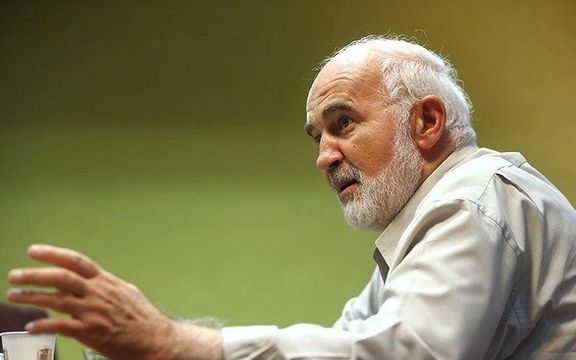
Meanwhile, members of the parliament say that Elias Naderan, the Chairman of one of the Iranian Parliament's budget committees made serious charges against the administration during a joint meeting of the administration and the parliament last week. His recent comment has not been made public yet, but he said two months ago that "The economy is the Achilles heel of the Raisi administration. It is good that he has so many economists in the cabinet, but what is more important is creating some kind of coordination among them."He called on Raisi to say clearly who is in charge of the country's economy.
Naderan said that the administration appears to be trying to circumvent the parliament in drawing the budget bill and stressed that this will bring about a new wave of inflation.
Meanwhile, high-profile conservative politician and former deputy speaker of the Majles for several years, Bahonarhas said in a pointed statement, "We do not expect Raisi to solve all the problems before the end of the Iranian year in March, but at least we like to hear that he has started to reform the economy in a way that would encourage investors and entrepreneurs to become active."He also suggested that Raisi should hand over dealing with ad-hoc emergencies to others and instead focus on more essential problems."
It is not just the Raisi administration that is the target of attacks and questions by like-minded politicians. The Majles has also been criticized for more or less the same kind of shortcomings. The last time Naderan asked the Majles about its inaction, it was when Naderan asked lawmakers why the Majles has had no visible output in the area of offering solutions for the country's problems after longer than a year since the Majles election.
Naderan also warned lawmakers against likening Raisi to puritan saints and popular politicians of the early 1980s. "These are exaggerations and unnecessary pleasantry aimed to secure a place for those lawmakers in the government," he said, adding that sycophants are not doing a service to Raisi, nor they are doing a good thing for the society.
Speaking about sycophants, Bahonar has also said recently that what they do is harmful to the government because they create unjustified expectations among the nation.
Meanwhile, Principlist activist Hassan Kanani Moqaddam said on Saturday that Raisi should seriously investigate the cases of nepotism and giving jobs to officials' family members and be accountable for these cases before the conservative camp and the nation. If he fails to do that, he is going to lose the society's trust in him, Kanani Moqaddam said.

Iran's economy has had almost no growth since its nuclear program gained momentum in 2004, to a large extent by the damage economic sanctions have inflicted.
Iranian hardliners claim they have defeated US sanctions, simply because the Islamic Republic still stands, but the cost of defiance has been the economic ruin of the country, mostly borne by citizens.
Iran’s counterproductive approach in pursuing even a civilian nuclear program is evident from the Bushehr reactor, built by Russia for generating 1,000 megawatts of electricity. It became operational a decade ago. Iran spent up to $8 billion to build the reactor, which has produced around $5 billion of electricity, leaving a profit of just $3 billion in ten years. Meanwhile, its fossil fuel power generation infrastructure was neglected and no renewable energy investments, except ill-planned dams, were made. Today, Iran suffers from serious power shortages.
But this is just a small example of the damage Iran’s nuclear ambitions have inflicted on the country.
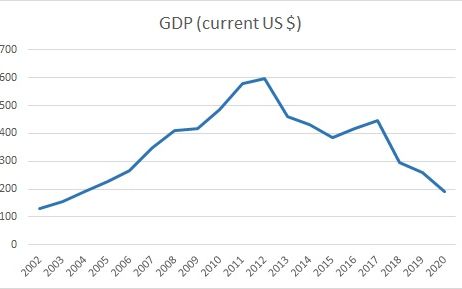
In 2020, based on World Bank estimates, Iran’s Gross National Product (GDP) reached $191.7 billion, which was one third of what it was ten years ago. The main reason for this huge economic retrenchment was international and United States sanctions against Iran since 2011, imposed to limit its nuclear program. The international community, including Russia and China, were concerned that Iran was pursuing more than a peaceful program and cooperated with the West to impose international economic sanctions beginning in 2010 and intensifying in 2011.
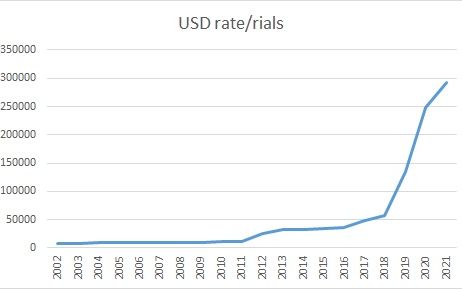
Calculated based on the free market rate of the US dollar in Tehran, the size of Iran’s economy in 2020 was the same as it was in 2004. After a substantial growth around 2010 due to very high oil prices, the economy began to decline from 2012 when international sanctions left their deep mark on Iran revenues.
During the period since 2011, successive Iranian governments relied on internal borrowing financed by printing money to maintain their operations. As a result, liquidity grew tenfold exacerbating inflation and in effect devaluing the national currency. People began losing their purchasing power and gradually falling into poverty.
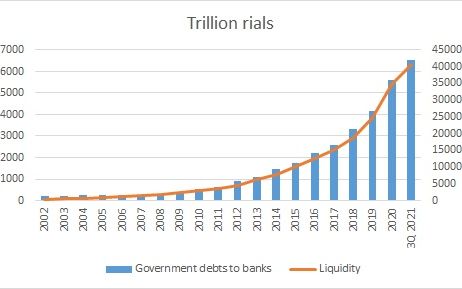
Since early 2018, Iran’s rial has dropped to more than 300,000 against the US dollar, while just four years ago the dollar was traded at 32,000 rials. Before the Islamic Republic, one US dollar bought 70 rials.
The government has been using the central bank as a money printing machine, instead of reforming the economy, and adopting policies to attract foreign and domestic investments. Government debt to the central bank and other state or quasi-state banks has grown tenfold in the past decade.
Based on estimates by the International Monetary Fund, government debt was 6.5 percent of Gross National Product from 2,000-2017, but in 2020 it had reached 33 percent of GDP.
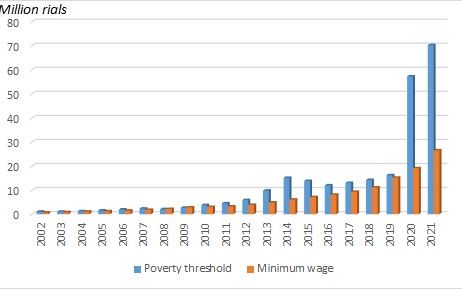
The impact on ordinary people has been devastating. While the minimum income needed to live just above poverty, as the rial lost value, has grown 70-fold in the past 20 years, wages and salaries have increased only 38-fold. While blue collar workers earn around $100-120 per month, office workers make $150-180. The minimum monthly income needed for a family of 3.3 people is $400.
The real numbers speak volumes about official claims that the Islamic Republic has defeated sanctions. The country has simply become poorer.
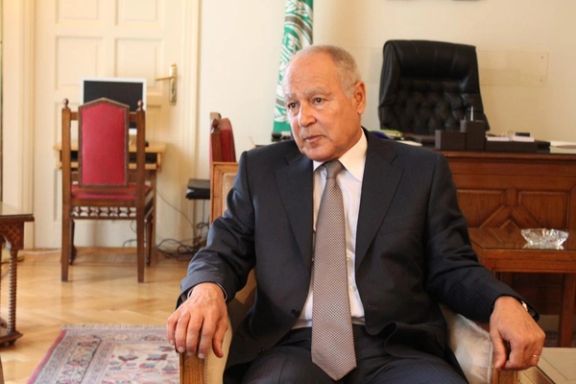
The Secretary General of the Arab League has said Iran wants to control the Straits of Hormuz and the Bab al-Mandab either directly or through proxies it funds.
Ahmed Aboul Gheit said during the Rome Mediterranean Dialogue mentioning attacks carried out in the 2019 in the Persian Gulf and against Saudi oil installations, as well as Houthi threats to navigation in the Red Sea highlighted Iran’s policies in the region.
The Arab League issued a statement on Saturday quoting Aboul Gheit as having said that both straits are vital for the global economy and protection of navigation in these areas should be a global priority.
Persian Gulf Arab states and their Sunni allies such as Egypt are concerned at Iran’s regional policy of creating and supporting militant groups to expand its influence.
Aboul Gheit said that Iran’s behavior and actions are the reason why it is difficult to establish a security system in the Persian Gulf. Iranian officials often boast of their influence in the region, which largely rests on Shiite proxy forces.
He added that he hopes ongoing negotiations would dissuade Iran from pursuing its policies. Both Saudi Arabia and the United Arab Emirates have begun engaging Iran in talks to reduce tensions.
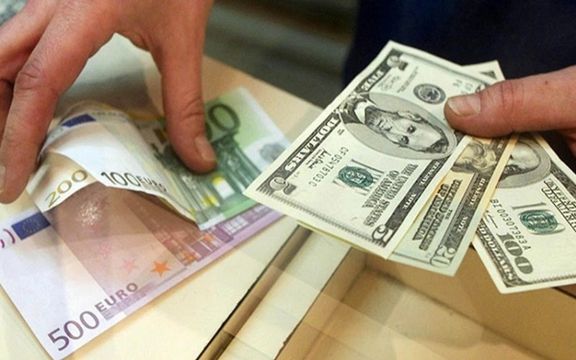
The decline in the value of Iran’s currency continued Sunday, after disappointing nuclear talks with world powers in Vienna added to economic uncertainty.
The free market value of the US dollar in Tehran shot up to 300,500 rials Sunday, a historic low for the battered currency. On Saturday the dollar had reached to just over 300,000 rials.
Despite government efforts to claim that the nuclear negotiations are not dead and could continue in a few days, the public remained unconvinced, buying more dollars.
The government feeling market demand restricted access to dollars at official exchange outlets earlier in the week, but the move led to demand shifting to unofficial dealers.
The current exchange rate shows the rial has fallen 4,500-fold since the Islamic Republic was set up in 1979. During the monarchy one US dollar was equal to just 70 rials.
The Iranian currency has fallen more than ninefold since early 2018, when it became apparent that then-president Donald Trump was inclined to leave the JCPOA and impose sanctions on Iran. He did so in May of that year and the rial has kept falling ever since.